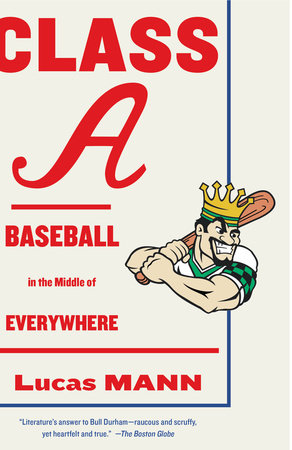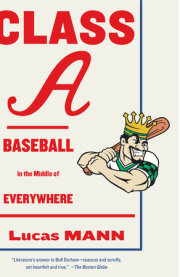The Mascot
I am Louie. Tonight, I am Louie. Tonight, regal and oversized, I am Louie the LumberKing.
I am not a Lumberjack. Lumberjacks are lowly, solitary creatures, and I am not that. I am industry and prosperity. I am hope.
I am nervous.
The mascot’s dressing room used to be the umpires’ dressing room, tucked under the bleachers on the first-base side of the stadium. Umps have signed the splintering cabinet where my uniform hangs. I think I can make out “Clinton forever” still scratched into the wood. And, “Remember me.” And, “A stop on the journey.” The journey to the majors. That’s what he hoped. That Clinton, Iowa, would turn into a AAA town like Columbus or Nashville and that would lead to Milwaukee or San Diego or even Yankee Stadium. But this is the Midwest League, Class A, the lowest rung of full-season professional baseball. Yankee Stadium is far off.
There’s a toilet in the corner, sprinkled with pubic hairs that I think could be both mascot and umpire in origin. There’s a tin of mint-flavored tobacco, empty. There’s a spit bottle, once a Gatorade bottle, now filled with saliva the color of tree sap.
Replicas of my image are littered everywhere, and they help me, despite the smells and the sight of this rotting cubicle, to buy into my own myth. Promotional postcards with my face saying, “Fun is always in style, come out to the ballpark!” A bobblehead of me. I tap my miniature ceramic skull, and it nods, comforting. There are cards from children addressed to me. “I love you, Louie.” “Your number one fan forever, Louie.”
I dress late, overwhelmed. I start with the socks, long black baseball socks. The kind that I first put on when I was five, schooled by my father the way I imagine young girls are when it comes time to slide on tights without causing a run. This is one of the earliest tactile memories I have, getting my toes all the way in and then rolling the polyester blend up my leg, feeling somehow armored.
The white pants come next. They’re too tight. They’re made for small, quick mascots because the ideal mascot is agile and teenage. I suck in, but you can’t suck in thighs or ass. I snap the waist closed, and my fat springs it open. I feel my hands sweating. I try again, fumbling, getting desperate. It’s Thirsty Thursday, and the house is always decently packed on days when alliteration can be made to signify fun. There’re over a thousand out there, quite a turnout in a town with a population that has dwindled to twenty-six thousand people. It’s one of the nights when the construction of this place, its self-referential glory, feels legitimate. I’m an important part of this.
The national anthem begins to play as finally, protected with a belt stretched to its last hole, my pants stay fastened and I’m halfway toward a full transformation.
Louie the LumberKing speaks of the past.
Did you know that there used to be more millionaires per capita in Clinton, Iowa, than anywhere else in the country? Did you know that? In the country.
I’ve heard that a lot since the beginning of the season because it’s true and it’s nice to say. At the turn of the twentieth century, Clinton was the center of a lumber empire. Millionaires were made here. Thirteen of them, all burly and proud in the portraits they left behind. They became barons of lumber, famous even beyond Clinton, and they built mansions that you could get lost in looming above the center of town. Though the industry and its spoils have long since disappeared, some mansions are still here. A few stand in a regal clump on Fifth Avenue, chopped up over the years into smaller and smaller apartments, odd looking from up close when you see the plastic children’s toys on the lawn. One mansion is a museum, rarely visited. One was demolished in the late 1970s, and a department store sprouted in its place. The department store is gone now.
A lot of things are gone. Things downtown closed; some collapsed. Things burned. In 1968 the sociopathic hippie son of a local businessman set fire to nine buildings because he was just so bored. He torched Clinton High School, another town landmark, and it turned to ash blocks away from the opulent homes gone empty.
The longtime fans, the ones I’ve sat with every game along the third-base line, a group that has dubbed themselves first the Roadkill Crew, then the Baseball Family, remember how high the smoke went. You must have been able to see it from everywhere, along Highway 30 and across the river in Illinois, too. The glow reflected on the water, shifting, glinting, like a puddle of oil on a tar road.
That hippie boy set the most famous fires, but not the last ones. Fans have told me that it feels as if something were always aflame now. When buildings are old, when nobody’s watching, anything can be tinder. Some of the fires are on YouTube. The dilapidated apartment with the mother and her two toddlers inside. The ancient white house without smoke detectors. The Lutheran church with flames dancing in the stained-glass windows. Old homes with no life in them, no care for them, so eventually they burn. And people like me, from anywhere, can click refresh, refresh on the videos. Three months ago, there was a string of fires on a single block, simultaneously ruled “not suspicious” and “under investigation” by local authorities. But fires don’t matter here and now in the stadium. And neither does ash.
I enter my torso.
I squeeze through the neck hole of discarded high school football shoulder pads. The XXL Lumber-Kings jersey that has been sewn onto this skeleton hangs off me, and when I tuck it into the pants, it gives my top half a superhero’s triangular shape.
Now for my head.
My head is made of mesh and wood and cardboard and felt. My head must be two feet in diameter, sturdy and square-jawed, capped with an enormous golden crown. There are fake veins running down my neck to show my intensity. I have a goatee sewn on, thick and black. I look like a suave, royal Paul Bunyan. My mouth is carved into a confident smirk, and when people look at me, they won’t know that it’s my mouth that I see through, a dual eyesight. I watch the world in front of me and at the same time the lining of my own skull, the scaffolding of my own construction. There’s a patch of dried blood inside my chin.
The door swings open, and I’m caught staring into the mirror, stroking my faux beard. It’s Mitch.
“You look fucking legit, bro,” he says.
“Really?” I say.
“Legit. Trust me. Legit.”
He tucks my neck into my shoulders. He stands back. He shoves me hard and says, “You fired up?”
I nod and almost topple forward with the weight of myself.
I am Louie.
When the anthem finishes, I grab my flag. I push through the door. I trip over a hose, only just catching myself on the dirt with the palm of my left hand, right hand still clinging to the banner. I start again. My approximation of a sprint takes me around the edge of the infield. The team limbers up for the crowd. I hold the flag in front of me and try to wave it as I run. I feel my head wobble as I pass Nick Franklin, the star shortstop. A year ago, after he graduated high school, he was given $1.28 million by the Seattle Mariners. Now he’s been sent here to Clinton, Iowa, to learn and then move up out of here on schedule. All the Lumber-Kings’ players were drafted or signed by the Mariners, and Clinton is just one of the early outposts in their development process. Seattle’s largest present investment, though, by a good amount, is young Nick Franklin, and so now he’s Clinton’s prize, a transplanted, temporary millionaire.
I stop running in front of the Baseball Family, their pocket of seats always full, even on the many Mondays when the rest of the stadium is empty. I see Betty laying out her candies, one by one, measuring the way each piece sits on the concrete wall, close enough to call out to the players, not so close that the candy falls on the field and the game is disrupted by a rogue Jolly Rancher. Next to the Jolly Ranchers are the strawberry suckers in wrappers made to look like real strawberries. And then the packets of Walmart-brand fruit snacks, first the white, then the blue, then the purple ones that taste like flat grape soda.
“When did you start?” I asked her once. “Why did you start?”
“One day, I thought they work so hard out there, they must get hungry,” she said. “That was fifteen years ago.”
The players remember, she told me. There’s a postcard at home from Derek Holland, who is famous now and pitches for the Texas Rangers in front of forty-five thousand people. It says, “Merry Christmas,” and is addressed to Grandma Betty. It says he misses the candy.
He was produced here, Derek Holland. In a way. He came here raw and nineteen, and in Clinton, with Clinton, in front of the fans, he was nurtured into something better than what had arrived.
Bill, Betty’s husband, keeps his sandaled feet hooked back like a bird’s talons, hidden under the shadow of his chair. He’s missing two toes, a memento from the years when he worked at Allied Steel, back when steel, along with paper, along with wood, along with plastic, along with corn, catalyzed the town. But Allied left with a lot of other businesses, and left behind 100,000 tons of coal tar blocks down from the riverfront stadium, not cleaned for decades. And long before that, Bill was standing on the work floor when a four-ton beam fell, smashing his foot and resulting in the steel plate that now heats his head in summer.
I realize that I like the eyes on me. I wave my flag, and I can trace gazes drifting back and forth along with my movements. It’s every overwrought fantasy I ever got lost in on Little League fields—the simple, pure importance of a body being looked at. It’s not me, really, but still, this vehicle that I operate commands attention. And I can’t say that being the temporary center of this world that I have made mine for the season, the diamond, the lights, all of it, doesn’t make me strut.
Copyright © 2013 by Lucas Mann. All rights reserved. No part of this excerpt may be reproduced or reprinted without permission in writing from the publisher.










